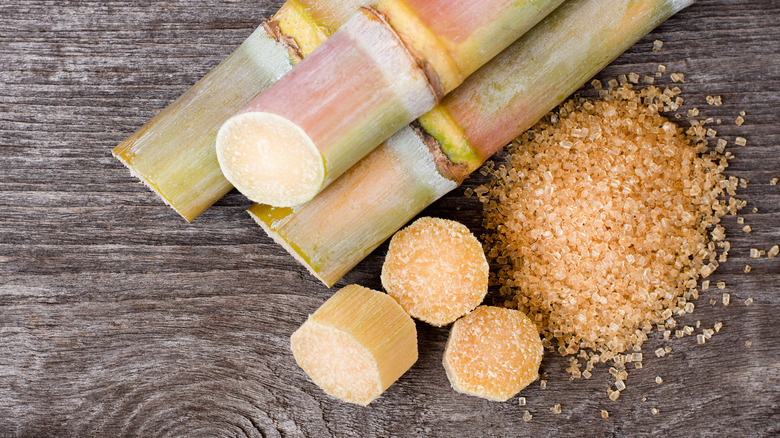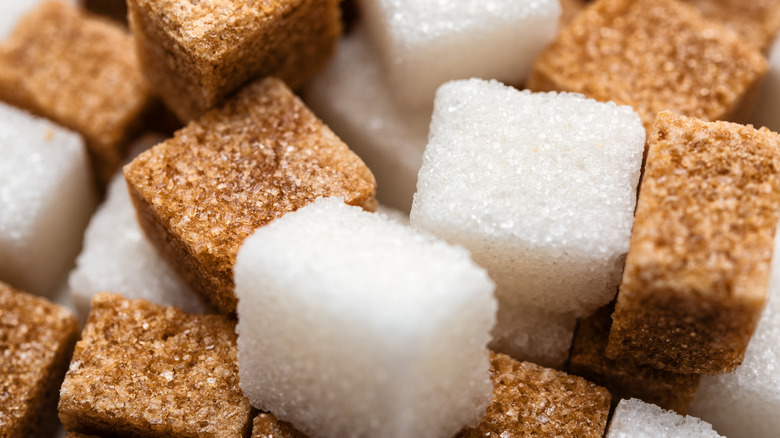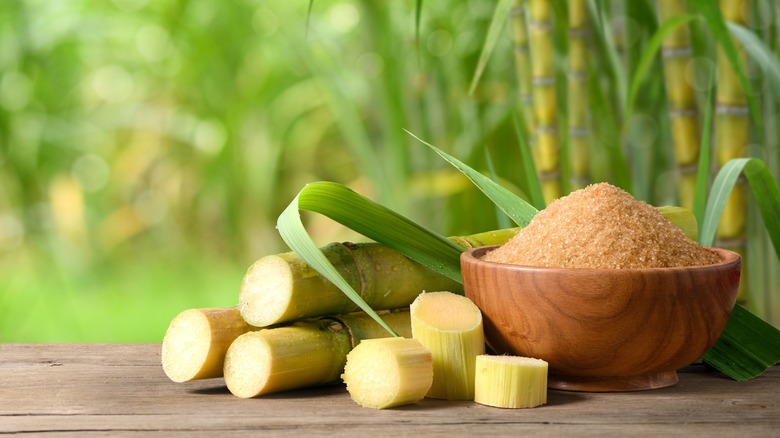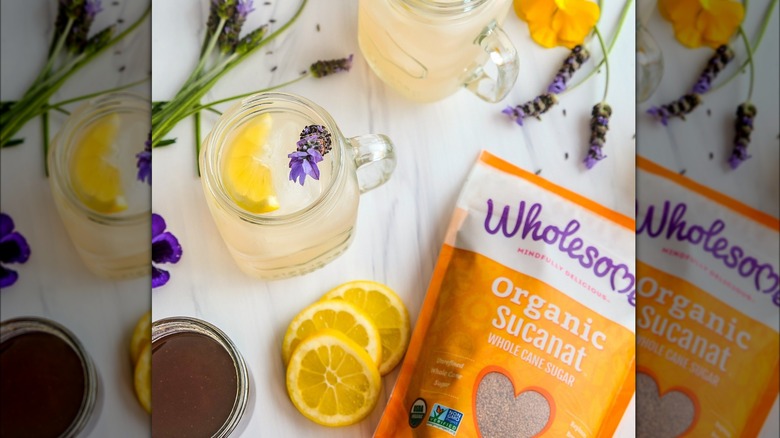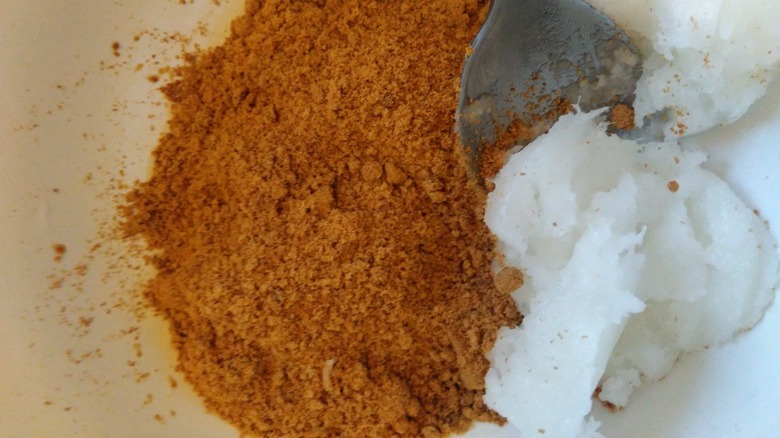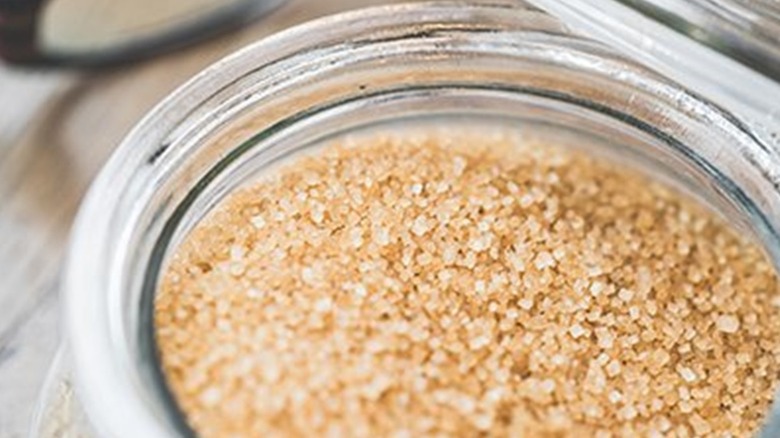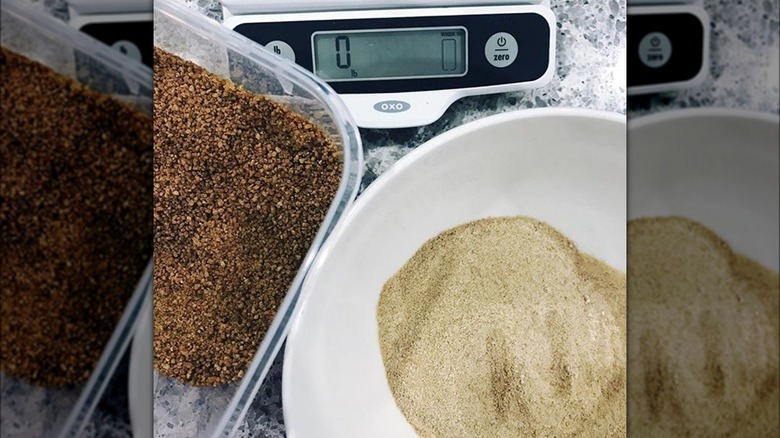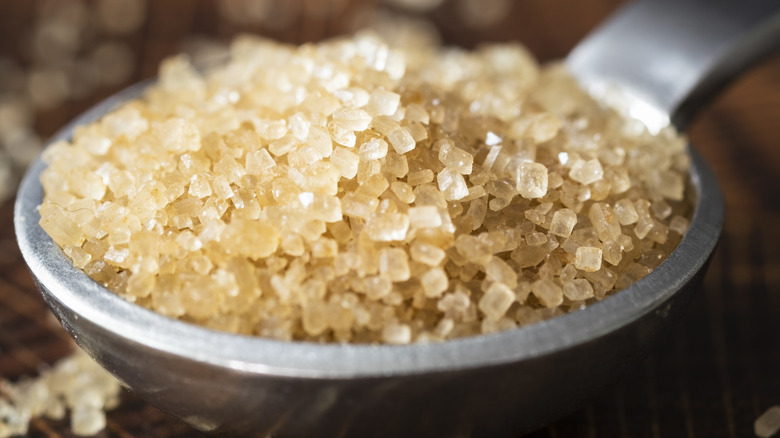What Is Sucanat Sugar, Anyway?
Sucanat — a portmanteau of the phrase "sugar cane natural" — is a type of unrefined, minimally processed cane sugar, touted in some circles as a healthy alternative to granulated sugar. Both are made from the juice of the sugarcane plant; however, granulated sugar undergoes extensive chemical and mechanical processing, while sucanat is made with minimal mechanical processing and no chemical additives. To understand why this makes such a big difference in nutritional content and taste, let's take a closer look at how these two types of sugar are made.
After sugarcane juice has been pressed and strained, sucanat is made by boiling that juice to evaporate the liquid, leaving behind a thick syrup that's paddled until it's cool, dry, and crystallized. The result is a coarse, natural sugar that's golden brown and flavored with molasses — the sweet, nutrient-dense byproduct of sugar production. As such, sucanat retains many of the sugarcane's minerals, trace elements, vitamins, and mineral salts.
To make granulated white sugar, on the other hand, sugarcane juice is chemically clarified before being boiled. The sucrose crystals that form after the juice is heated are then mechanically removed from the molasses and further refined, essentially stripping them of any nutritional benefit.
Sucanat differs from granulated sugar in both taste and nutrition
Because of the differences in how sucanat and granulated sugar are processed, the two differ on a molecular level. Granulated sugar consists almost entirely of sucrose, while sucanat contains sucrose, fructose, and glucose. Not only is glucose essential for healthy brain function, but because sucanat is less processed than granulated sugar, the body can digest it more slowly than sucrose, which tends to cause a spike in blood sugar.
These molecular differences can also have a subtle effect on sucanat's taste. Containing 99% sucrose, granulated sugar tastes more overtly sweet than sucanat, with the sweetness lingering longer on your tongue. Because sucanat also contains a significant amount of molasses, it often has a robust, smokey, almost raisin-like taste that's more complex than regular table sugar. Regardless of the differences in taste, many people use sucanat as a sugar substitute in cooking and baking or stirred into coffee and tea.
Where does sucanat come from?
Sucanat was created in the 1970s by organic food company Pronatec as an alternative to refined sugar. The company's stated mission was (and still is) to bring fair-trade opportunities to regions around the world where sstaple ingredients like cocoa and sugar are produced. The initial aim of founder Albert Yersin was to develop a form of sugar that didn't promote tooth decay while standing as a healthier alternative to highly processed refined sugar.
Though sucanat was first produced in Switzerland, Pronatec has used organic cane sugar sourced from farms in Costa Rica since 1997 to generate its sweetener. The region is ideal for sugar cane farming all year round, thanks to the high-humidity tropical climate. Local manufacturer Assukar ensures all European safety and quality standards are adhered to during sucanat processing. The term "sucanat" is a registered trademark, which means it's both a specific type of sugar and a brand name.
Where to buy sucanat
Though the name may be unfamiliar to many, there's no shortage of places to buy sucanat. Big-name retailers like Walmart sell bags through third-party retailers, available via website orders; Whole Foods stocks one-pound bags of the sweetener from organic sweetener company Wholesome. Online shoppers can also try sucanat with a direct-to-home delivery from Amazon, where several smaller brands offer one- to three-pound bags.
Even with sucanat being relatively widely available, a price barrier may prevent everyday sugar users from testing it out. A one-pound bag from Amazon is priced at over $9.00, while a two-pound bag from the Walmart website retails for about $14.00 plus shipping. By comparison, a four-pound bag of refined sugar at Walmart will set shoppers back $3.00 and change; a two-pound bag of brown sugar, closer in flavor to sucanat, is a little over $2.00. The organic nature and specialized production of sucanat may justify the higher price, but sugar-curious customers may be reluctant to spend more than twice as much for a sweetener they aren't guaranteed to like.
How to cook with sucanat
As with other alternative sweeteners, it isn't a one-to-one ratio when substituting sucanat in dishes that call for sugar in its more highly processed forms. The greater concentration of molasses imparts a stronger flavor, while the lower sucrose content makes sucanat slightly less sweet than familiar baking sugar. This means replacing white or brown sugar with sucanat requires sampling and adjustment, depending on the recipe. A good place to start is subbing out three tablespoons of sucanat to two tablespoons of either white or brown sugar when trying it out in baked goods. Sucanat crystals are larger than other sugars; pulverizing them in a grinder will help keep the texture consistent. It's also helpful to know that sucanat doesn't melt or caramelize as easily as refined sugars. This makes it less good for candies and sauces.
Aside from making accommodations in recipes, sucanat can stand in for your usual sugars as a topping for hot cereals or a mix-in for hot beverages — instances where the difference in texture and flavor won't be as dramatic. It's easy enough to sprinkle a bit on and taste to decide if more is needed.
Nutritional information about sucanat
Though sucanat matches table sugar's calorie content, this less-refined version of cane sugar contains higher quantities of antioxidants and nutrients like potassium, calcium, and magnesium, as well as vitamin A. While this doesn't mean sucanat is a health food, it is an alternative for anyone hoping to minimize their refined sugar intake. The good news is that its versatility in replacing other sugars means you can test out sucanat to see if the flavor and usability suit your needs for a sweetener that offers at least a little something more in the way of nutrients.
For plant-based eaters keeping conscious of the invisible animal elements in sweeteners, there's comfort in knowing that sucanat forgoes the use of bone char during processing. Bone char is a filtration medium made from animal bones that some manufacturers use to give sugar its ultra-white hue. Since brown sugar is just white sugar with molasses added, bone char is part of its manufacturing as well. Being an organic and less-processed sugar, sucanat's production does not include bone char filtering.
Varieties of sucanat
Organic sweetener company Wholesome sells sucanat in two varieties: original, which is closer to white sugar, and panela, a more robust version similar to brown sugar. It's available from many other brands as well.
Sucanat is similar to other less-processed versions of sugar. The larger size and amber color of the crystals in the bag are sure to remind sugar users of turbinado sugar, a minimally-processed sugar sometimes referred to as "raw," even though some impurities are removed. Muscovado sugar, made in Colombia and India as well as the West Indies, is another coarse form of cane sugar that retains molasses, imbuing it with a rich flavor similar to sucanat. Jaggery, found largely in Asia and Africa and used in Ayurvedic medicine India, is a golden sugar that's also reminiscent of sucanat, though it's sold in rock-sized clusters rather than in granular form. Like sucanat, all of these sugars are intended to be less refined than regular store-bought sugar, creating a whole suite of sweeteners for sugar fans to investigate.
How to store sucanat
Like other sugars, sucanat should be stored in a cool, dry place to avoid clumping and flavor deterioration. If purchased in bulk form, sucanat should be stored in a lidded jar and stashed in a cabinet or pantry. For table use, dole out a bit in a sugar bowl with a lid, but consider returning the unused portion to your storage container for maximum freshness. Most options come in either a resealable bag or a screw-top canister, which should provide enough protection to do the trick without any extra effort. You can store your sucanat alongside your existing baking supplies to have a ready supply on hand for when the siren call of kitchen experimentation draws you away from your usual ingredients and into the world of cane sugar in a more natural form.
Most home bakers will find that the extra expense of sucanat is motivation to make this sweetener go as far as possible. Luckily, if kept away from moisture and air, it can last almost indefinitely, a boon for chefs eager to spend a little extra to try it out.
